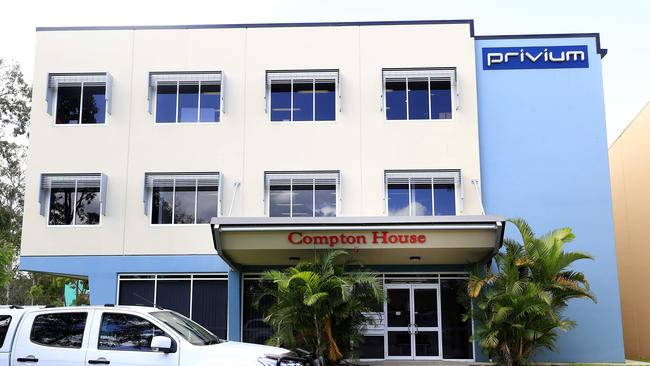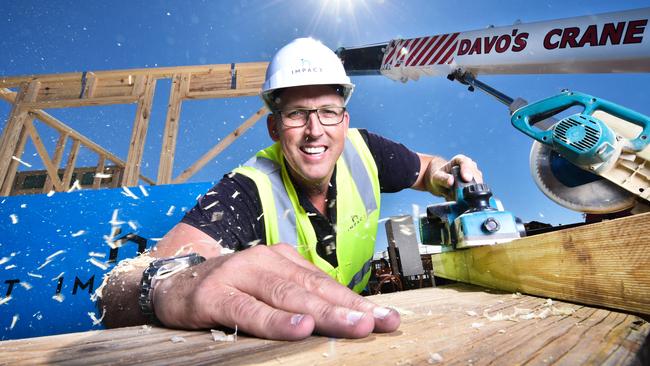$20m disappeared from failed builder Privium before collapse: court told
The boss of failed Queensland builder Privium allegedly set up a complex series of transactions before its collapse that saw $20m effectively disappear from the company, a court has heard.

The boss of failed national building firm Privium allegedly set up a complex series of transactions before its collapse that saw $20m effectively disappear from the company, a court has heard.
A public examination by liquidators in the Federal Court in Brisbane heard Privium founder and director Robert Harder planned to establish his own cryptocurrency through an entity called Open Gold and set up a managed investment scheme using blockchain technology.
The court was told of a series of “round robin” transactions in excess of $20m flowing from Privium to other entities set up by Mr Harder to fund the Open Gold transaction.
Privium’s former legal adviser Louis de Beer said Mr Harder had a penchant for such circular transactions, which he referred to as “Hardernomics”. “I don’t think his shareholders understood,” said Mr De Beer. As far as he was aware, there was no advantage to Privium from the transaction and he did not know where the cash ended up.
He said Mr Harder may have been trying to get a tax rebate from the transaction that “he was not entitled to”. He did not believe it was a ploy by Mr Harder to remove funds from the company even though “everyone was speculating about why he did it”.
Privium Group, which was once the country’s eighth largest builder, collapsed in late 2021 owing $80m and leaving hundreds of unfinished homes.
The public examination is also expected to hear evidence about special dividends paid to related entities to Privium as well as special dividends paid to shareholders.
Last year it was revealed that funds from a Christian charity founded by Mr Harder were used to pay off credit card debts and fund personal spending of more than $1m.
Mr Harder, who is not accused of any wrongdoing, has declined to comment. He and his wife Rachel are expected to be called to give evidence later this month.
The court also heard Mr Harder set up a charity to use “tax benefits” to provide housing for disadvantaged persons. Mr De Beer, who provided advice through his law firm NXT Legal to Privium and Mr Harder, said the charity called Joii was aimed at the “upliftment of the disadvantaged” but he was not aware of any money ever being used for that purpose.

South African-born Mr De Beer, who had initially planned to donate some of his own money to Joii, became concerned when Mr Harder took personal control of the charity from its original general manager Ken Houliston.
“Mr Harder was quite a robust businessman and this was a not-for-profit,” Mr de Beer told the hearing. “Ken really had a heart for the community and wanted to see good done. Myself and my wife have been friends with him since we arrived in Australia.”
Mr de Beer said he had decided not to donate “a cent” to Joii after Mr Harder took and over and decided he “would rather channel it elsewhere”.
He said Joii operated a series of trade businesses, including roofing and carpentry, which provided labour services to Privium.
“My understanding was there wouldn’t be a benefit to (Privium from the arrangement) and I don’t know if there was,” he said.
“My understanding was that rather than Privium get an independent third-party subcontractor, they would give the business to Joii and the profit from that component would go back into the community.”
But Mr de Beer said he did not know if any funds were returned to Joii for charitable purposes. “The financials would show that and I sincerely hope it was,” said Mr De Beer.
He said Joii was never an investor in NXT Legal, but worked on a retainer and initially undertook conveyancing and other legal work for both Privium and the charity.
But Mr de Beer expressed concern about the way Mr Harder went about seeking advice.
“I would have liked to have been given the bigger picture but it was never provided, which I found a little bit concerning. He would be working on a lot of new initiatives almost every day so it was hard to get a coherent picture of what you were doing.”
Mr de Beer also was asked about Privium’s dealings with a company called Property Alternative Group, which he said acted as “sort of side gig” for Mr Harder’s own development projects. “He (Mr Harder) did a whole lot of developments on the side probably with the knowledge of all the other directors, I’m sure,” he said. The public examination has been adjourned to November 20.






